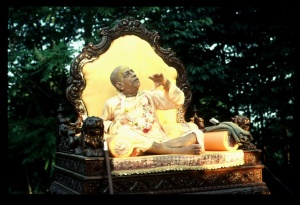SB 10.88.38-39: Difference between revisions
m (1 revision(s)) |
(Vanibot #0018 edit: make synonym terms in Sanskrit italic in SB - Vanisource) |
||
| Line 1: | Line 1: | ||
{{info | {{info | ||
|speaker=Lord | |speaker=Lord Nārāyaṇa the Supreme Personality of Godhead | ||
|listener=Lord | |listener=Lord Śiva | ||
}} | }} | ||
[[Category:Srimad-Bhagavatam - Canto 10 Chapter 88]] | |||
[[Category:Bhagavatam Verses Spoken by Lord Narayana - Vanisource|108838]] | |||
<div style="float:left">'''[[Srimad-Bhagavatam]] - [[SB 10|Tenth Canto]] - [[SB 10.88: Lord Siva Saved from Vrkasura|Chapter 88: Lord Śiva Saved from Vṛkāsura]]'''</div> | |||
<div style="float:right">[[File:Go-previous.png|link=SB 10.88.37]] '''[[SB 10.88.37]] - [[SB 10.88.40]]''' [[File:Go-next.png|link=SB 10.88.40]]</div> | |||
{{RandomImage}} | |||
{{SBnotice}} | |||
==== TEXTS 38-39 ==== | ==== TEXTS 38-39 ==== | ||
<div | <div class="verse"> | ||
muktaṁ giriśam abhyāha | :muktaṁ giriśam abhyāha | ||
bhagavān puruṣottamaḥ | :bhagavān puruṣottamaḥ | ||
aho deva mahā-deva | :aho deva mahā-deva | ||
pāpo 'yaṁ svena pāpmanā | :pāpo 'yaṁ svena pāpmanā | ||
hataḥ ko nu mahatsv īśa | |||
jantur vai kṛta-kilbiṣaḥ | :hataḥ ko nu mahatsv īśa | ||
kṣemī syāt kim u viśveśe | :jantur vai kṛta-kilbiṣaḥ | ||
kṛtāgasko jagad-gurau | :kṣemī syāt kim u viśveśe | ||
:kṛtāgasko jagad-gurau | |||
</div> | </div> | ||
| Line 21: | Line 27: | ||
==== SYNONYMS ==== | ==== SYNONYMS ==== | ||
<div | <div class="synonyms"> | ||
''muktam''—delivered; ''giriśam''—Lord Śiva; ''abhyāha''—addressed; ''bhagavān puruṣa-uttamaḥ''—the Supreme Personality of Godhead (Nārāyaṇa); ''aho''—ah; ''deva''—My dear lord; ''mahā-deva''—Śiva; ''pāpaḥ''—sinful; ''ayam''—this person; ''svena''—by his own; ''pāpmanā''—sins; ''hataḥ''—killed; ''kaḥ''—what; ''nu''—indeed; ''mahatsu''—toward elevated saints; ''īśa''—O master; ''jantuḥ''—living being; ''vai''—indeed; ''kṛta''—having done; ''kilbiṣaḥ''—offense; ''kṣemī''—fortunate; ''syāt''—can be; ''kim u''—what to speak, moreover; ''viśva''—of the universe; ''īśe''—against the lord (you); ''kṛta-āgaskaḥ''—having committed offense; ''jagat''—of the universe; ''gurau''—the spiritual master. | |||
</div> | </div> | ||
{{SBcollapse}} | |||
==== TRANSLATION ==== | ==== TRANSLATION ==== | ||
<div | <div class="translation"> | ||
The Supreme Personality of Godhead then addressed Lord Giriśa, who was now out of danger: "Just see, O Mahādeva, My lord, how this wicked man has been killed by his own sinful reactions. Indeed, what living being can hope for good fortune if he offends exalted saints, what to speak of offending the lord and spiritual master of the universe?" | The Supreme Personality of Godhead then addressed Lord Giriśa, who was now out of danger: "Just see, O Mahādeva, My lord, how this wicked man has been killed by his own sinful reactions. Indeed, what living being can hope for good fortune if he offends exalted saints, what to speak of offending the lord and spiritual master of the universe?" | ||
</div> | </div> | ||
| Line 35: | Line 41: | ||
==== PURPORT ==== | ==== PURPORT ==== | ||
<div | <div class="purport"> | ||
According to Śrīla Viśvanātha Cakravartī, this statement of Lord Viṣṇu's implies a mild scolding: "My dear possessor of unlimited vision, O you of clear intelligence, benedictions should not be given to wicked demons in this way. You could have been killed! But you were only concerned about saving this poor soul, so you disregarded what would happen to you as a result." Thus, Ācārya Viśvanātha Cakravartī points out, Lord Nārāyaṇa's mild rebuke also highlighted Lord Śiva's exceptional compassion. | According to Śrīla Viśvanātha Cakravartī, this statement of Lord Viṣṇu's implies a mild scolding: "My dear possessor of unlimited vision, O you of clear intelligence, benedictions should not be given to wicked demons in this way. You could have been killed! But you were only concerned about saving this poor soul, so you disregarded what would happen to you as a result." Thus, Ācārya Viśvanātha Cakravartī points out, Lord Nārāyaṇa's mild rebuke also highlighted Lord Śiva's exceptional compassion. | ||
</div> | </div> | ||
__NOTOC__ | </div> | ||
</div> | |||
<div style="float:right">[[File:Go-previous.png|link=SB 10.88.37]] '''[[SB 10.88.37]] - [[SB 10.88.40]]''' [[File:Go-next.png|link=SB 10.88.40]]</div> | |||
__NOTOC__ | |||
__NOEDITSECTION__ | |||
Revision as of 20:31, 1 December 2017

A.C. Bhaktivedanta Swami Prabhupada
Please note: The synonyms, translation and purport of this verse were composed by disciples of Śrīla Prabhupāda
TEXTS 38-39
- muktaṁ giriśam abhyāha
- bhagavān puruṣottamaḥ
- aho deva mahā-deva
- pāpo 'yaṁ svena pāpmanā
- hataḥ ko nu mahatsv īśa
- jantur vai kṛta-kilbiṣaḥ
- kṣemī syāt kim u viśveśe
- kṛtāgasko jagad-gurau
SYNONYMS
muktam—delivered; giriśam—Lord Śiva; abhyāha—addressed; bhagavān puruṣa-uttamaḥ—the Supreme Personality of Godhead (Nārāyaṇa); aho—ah; deva—My dear lord; mahā-deva—Śiva; pāpaḥ—sinful; ayam—this person; svena—by his own; pāpmanā—sins; hataḥ—killed; kaḥ—what; nu—indeed; mahatsu—toward elevated saints; īśa—O master; jantuḥ—living being; vai—indeed; kṛta—having done; kilbiṣaḥ—offense; kṣemī—fortunate; syāt—can be; kim u—what to speak, moreover; viśva—of the universe; īśe—against the lord (you); kṛta-āgaskaḥ—having committed offense; jagat—of the universe; gurau—the spiritual master.
Translation and purport composed by disciples of Śrīla Prabhupāda
TRANSLATION
The Supreme Personality of Godhead then addressed Lord Giriśa, who was now out of danger: "Just see, O Mahādeva, My lord, how this wicked man has been killed by his own sinful reactions. Indeed, what living being can hope for good fortune if he offends exalted saints, what to speak of offending the lord and spiritual master of the universe?"
PURPORT
According to Śrīla Viśvanātha Cakravartī, this statement of Lord Viṣṇu's implies a mild scolding: "My dear possessor of unlimited vision, O you of clear intelligence, benedictions should not be given to wicked demons in this way. You could have been killed! But you were only concerned about saving this poor soul, so you disregarded what would happen to you as a result." Thus, Ācārya Viśvanātha Cakravartī points out, Lord Nārāyaṇa's mild rebuke also highlighted Lord Śiva's exceptional compassion.